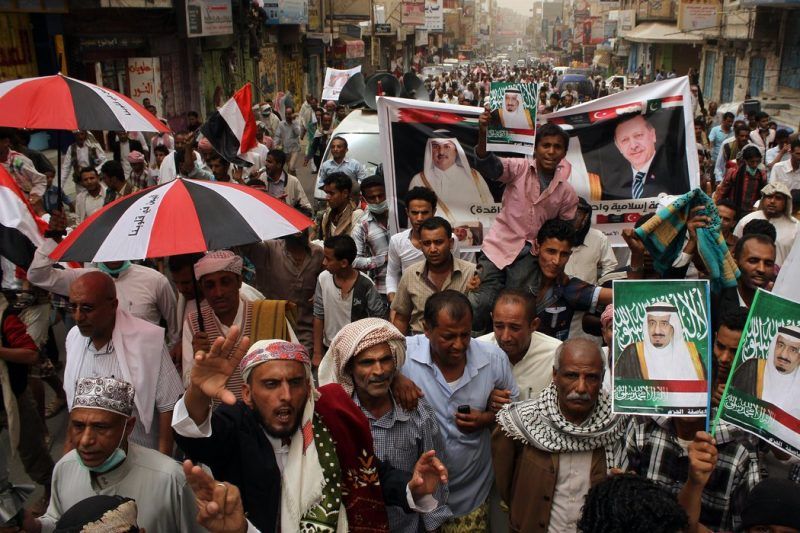
If the Iran nuclear deal was an earthquake shaking the Middle East’s strategic landscape, one of the most dramatic aftershocks was the surprising arrival last month in Saudi Arabia of a high-level delegation from Hamas. The visit by the Islamist organization that rules Gaza is the latest sign of an about-face in Saudi policy, which is now seeking a rapprochement with the regional Muslim Brotherhood movement, to which Hamas belongs.
Saudi Arabia has long been mistrustful of the Brotherhood. Traditionally, the kingdom has regarded the Islamists as a political threat and a rival source of Islamic authority in the Middle East. This suspicion deteriorated into open hostility as Brotherhood parties threatened to take over key Arab states following the Arab Spring uprisings in Tunisia, Egypt and elsewhere in 2011.
The Saudis therefore welcomed the ouster of the Egyptian president, Mohamed Morsi, a Brotherhood leader, in 2013. That was the first of a series of major setbacks for the Brotherhood throughout the region. The low point came last year when the Saudi government declared the Brotherhood a terrorist group. (Hamas is the only Brotherhood party that is openly armed and advocates the use of violence, specifically against Israel.)
The Saudi foreign minister, Adel Al-Jubeir, insisted that the recent Hamas visit was for religious, not political, reasons and that “the position of the kingdom with regards to Hamas has not changed.” But pilgrimages to Mecca don’t usually involve extensive meetings with the entire leadership, including King Salman bin Abdulaziz and his principal deputies, Crown Prince Muhammed bin Nayef and Defense Minister Mohammed bin Salman.
The Hamas delegation included its chief representatives in Egypt and Turkey, which means that its leading factions were all represented: This was not a power play by one element. As a courtesy, during the visit the Saudis released eight Hamas members jailed for illegal political activities in Saudi Arabia.
In another sign of a Saudi opening to Brotherhood groups, Saudi-backed forces in Yemen last month installed Nayef al-Bakri of the Brotherhood-oriented Al-Islah party (also designated a terrorist group by Riyadh) as governor of the key southern city of Aden, which Saudi-backed forces had just recaptured.
Three other leading Brotherhood figures — Rachid al-Ghannouchi of Tunisia’s Ennahda Party, Abdul Majeed al-Zindani of Al-Islah and Hammam Saeed of Jordan’s Muslim Brotherhood — have all visited Saudi Arabia in recent weeks. There was even a rumor, as yet neither confirmed nor denied, that the Brotherhood has been quietly removed from the kingdom’s terrorism list.
A critical mass of circumstances accounts for this shift in Saudi attitudes. King Salman is more sympathetic to religious conservatives than his predecessor was. The weakened Brotherhood is now perceived as less of a threat, while the extremists of the Islamic State are viewed as far more dangerous. Above all, the new Saudi approach is shaped by the regional confrontation with Tehran in the wake of the nuclear agreement.
Riyadh has been strengthening relations with its fellow Gulf Cooperation Council member Qatar, which reportedly brokered the Hamas visit. It has also stepped up outreach efforts to Turkey and Sudan. This appears to be a broad-based Saudi attempt to recruit as many Sunni political actors across the Middle East as possible to confront Iran and its Shiite allies.
The Saudis and the Brotherhood can find common cause in several regional conflicts. As a leading Saudi journalist, Jamal Khashoggi, told me, “Saudi Arabia is interested in working with the Brotherhood because it is politically effective in places like Syria and Yemen.”
The Saudi calculation is that it cannot simultaneously take on Iran and its Shiite Islamist allies, like Hezbollah, as well as jihadist movements, like Al Qaeda and the Islamic State, and more mainstream Islamists. Hence the Saudi outreach to the more moderate Brotherhood.
For the Saudis, wooing Hamas will ensure that Iran loses influence in Gaza, leaving only Islamic Jihad as a wayward ally. Iran has reportedly responded by stopping its funding of Hamas.
Hamas itself has competing factions, however, and its military wing, the Izzedine al-Qassam Brigades, has deep ties to Iran. The Brigades leadership may fear that the Gulf is a good source of cash but not of arms.
With Hamas’s control of Gaza facing new challenges from Islamic State-inspired jihadists, it’s possible the militarist perspective could prevail. But the Saudi détente with the Brotherhood is not limited to Hamas, and more is at stake for the region’s Islamists. The entire Brotherhood movement faced an existential crisis with the ouster of Mr. Morsi and Egypt’s crackdown; now Riyadh is offering it a lifeline.
A closer Saudi relationship with Hamas will require skillful diplomacy. Riyadh must avoid making relations worse with Egypt, which remains as hostile as ever to the Brotherhood, or undermining the Palestinian Authority in the West Bank, which is controlled by Fatah, the majority movement of the Palestine Liberation Organization. The Saudis must move carefully to ensure that they are seen in Cairo and Ramallah as playing a constructive role, promoting both the reconstruction of Gaza and reconciliation between Fatah and Hamas.
The nuclear agreement with Iran has propelled Saudi Arabia to make rolling back Iran’s regional influence a priority. Its strategy is to unite as much as possible of the Sunni Middle East (excepting extremists like the Islamic State and Al Qaeda). Riyadh may be right that this is the best way to strengthen its hand against Tehran’s cohesive Shiite bloc. But it also means consolidating already sharp sectarian divisions in the Middle East.
That will make matters more difficult for outside powers like the United States that do not have a natural affinity with either camp. As for the peoples of the region, a new regional order based on sectarian identity is dangerous indeed.
Hussein Ibish, a senior resident scholar at the Arab Gulf States Institute in Washington, is a writer and a broadcaster.
